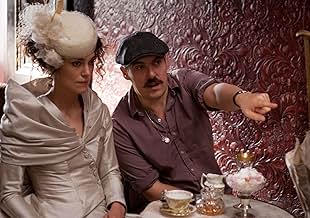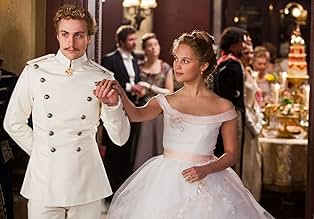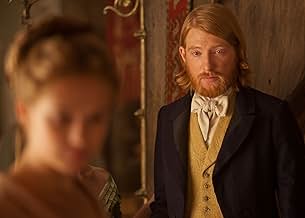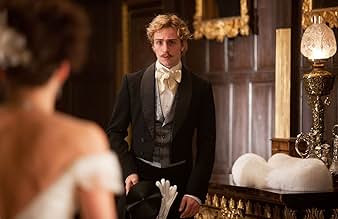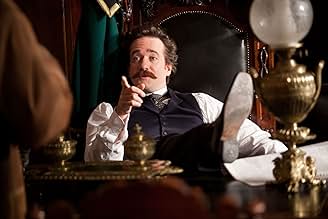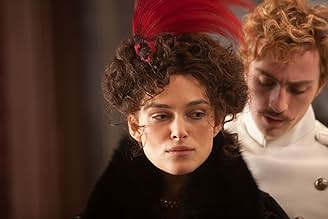In late-19th-century Russian high society, St. Petersburg aristocrat Anna Karenina enters into a life-changing affair with the dashing Count Alexei Vronsky.In late-19th-century Russian high society, St. Petersburg aristocrat Anna Karenina enters into a life-changing affair with the dashing Count Alexei Vronsky.In late-19th-century Russian high society, St. Petersburg aristocrat Anna Karenina enters into a life-changing affair with the dashing Count Alexei Vronsky.
- Won 1 Oscar
- 33 wins & 54 nominations total
- Director
- Writers
- All cast & crew
- Production, box office & more at IMDbPro
Storyline
Did you know
- TriviaOne of Alicia Vikander's favorite experiences from the production was the filming that took place in the countryside outside of St. Petersburg, Russia. The temperatures dropped below -40 °C, and she stayed in a cabin for five days that didn't have hot water and only featured benches instead of beds. Meanwhile, Russian security guards protected her and co-star 'Domhnall Gleeson' from wild wolves and bears that dominated the deserted area.
- GoofsThe label of the bottle of morphine Anna drinks from changes from "la Morphine" to "Morphine" between shots. The only correct French form would be without an article (prescriptions would have been written in Latin in 19th-century Russia anyway).
- ConnectionsFeatured in Projector: Anna Karenina (2012)
- SoundtracksSong for a New Life (Masha's Song)
(uncredited)
Written by Anoushka Shankar
Performed by Tannishtha Chatterjee
Featured review
Remember that scene early in Inception where Leonardo di Caprio and Ellen Page are sitting at a sidewalk cafe as he explains how his dream technology works? He points out that in a dream you never question the time, place, or circumstances in which you find yourself, you just accept them as normal. Suddenly windows start exploding, pavement buckles, the streets of Paris start curving over their heads, and you realize that the entire sequence has played out just the way he described it. You, sitting in the audience, never questioned how they got to that cafe in the 1st place, you just took it for granted.
The reason Christopher Nolan was able to pull this off so deftly was that we bring the same short-cut sensibility with us to the movies. We see a person in an office, a taxi, a restaurant, and an apartment in quick succession but don't want to be bored with the tedium of actually getting from one of those locales to the next, so we gladly accept the cinematic convention of just jump-cutting from scene to scene.
The most recent (of many) productions of Anna Karenina, Leo Tolstoy's classic novel of a high-society scandal in doomed imperial Russia circa 1890, reveals some of this artifice to the inquisitive eye. Much of the film appears to be set on an actual theater stage, but characters walk on and off that stage to what appears to be the real world — or saunter backstage to have it turn into a train station. Much of it is stilted and artificial — such as all the other dancers freezing in position during the Platonic ideal of a ballroom waltz (with heavy swing-dance styling), as Anna and Vronsky swirl among them. The extent of privilege of the Russian noble classes is underlined by the way in which the various counts and dukes just casually hold out a hand, expecting out of habit that a drink or the next piece of paperwork will be instantly placed there by an obsequious lackey, or holding out an arm while doing a 360, never questioning that the office suit coat will be removed by the left-hand lackey while the evening jacket is being simultaneously slipped on by the right-hand one. And director Joe Wright cuts the audience no expositional slack whatsoever in introducing the characters or keeping their various nicknames straight (and Russians have lots of nicknames); you just have to pick up who's who on your own.
The costuming is sumptuous and seems a lock for this year's Oscar in that category. However, I was bemused that, shortly after leaving the Sundance Theater, I swung by the Middleton Marriott to drop off some fliers at TeslaCon, a steampunk immersion convention, and found myself walking into the kind of artificial environment Wright had created, with congoers all self-costumed nearly as well as the best Hollywood could produce.
All of this style and metapresentation comes at a price, however, and the price is the humanity of the characters. Due to the mode of presentation, we can never suspend our disbelief long enuf to start thinking of them as real people; they remain actors in a play, and we're never allowed to forget it.
Keira Knightley is radiant as Anna, and Jude Law is agonizingly prim, principled, and earnest as Karenin (and we can't help but feel serious empathy for him, despite learning that his parliamentary maneuverings represent the worst form of bigotry), but I was disappointed in Aaron Taylor-Johnson as Vronsky. He seemed too effete and foppish and not nearly dashing enuf to win Anna's heart at first glance. But then, as he remarked, "you can't ask why about love."
This version of AK will certainly be remembered more for its staging than for its story. Perhaps that's excusable, since the story has been told so many times before, and often well and beautifully, but it's a shame that we were reduced to thinking of it as a necessary nuisance getting in the way of the stagecraft.
The reason Christopher Nolan was able to pull this off so deftly was that we bring the same short-cut sensibility with us to the movies. We see a person in an office, a taxi, a restaurant, and an apartment in quick succession but don't want to be bored with the tedium of actually getting from one of those locales to the next, so we gladly accept the cinematic convention of just jump-cutting from scene to scene.
The most recent (of many) productions of Anna Karenina, Leo Tolstoy's classic novel of a high-society scandal in doomed imperial Russia circa 1890, reveals some of this artifice to the inquisitive eye. Much of the film appears to be set on an actual theater stage, but characters walk on and off that stage to what appears to be the real world — or saunter backstage to have it turn into a train station. Much of it is stilted and artificial — such as all the other dancers freezing in position during the Platonic ideal of a ballroom waltz (with heavy swing-dance styling), as Anna and Vronsky swirl among them. The extent of privilege of the Russian noble classes is underlined by the way in which the various counts and dukes just casually hold out a hand, expecting out of habit that a drink or the next piece of paperwork will be instantly placed there by an obsequious lackey, or holding out an arm while doing a 360, never questioning that the office suit coat will be removed by the left-hand lackey while the evening jacket is being simultaneously slipped on by the right-hand one. And director Joe Wright cuts the audience no expositional slack whatsoever in introducing the characters or keeping their various nicknames straight (and Russians have lots of nicknames); you just have to pick up who's who on your own.
The costuming is sumptuous and seems a lock for this year's Oscar in that category. However, I was bemused that, shortly after leaving the Sundance Theater, I swung by the Middleton Marriott to drop off some fliers at TeslaCon, a steampunk immersion convention, and found myself walking into the kind of artificial environment Wright had created, with congoers all self-costumed nearly as well as the best Hollywood could produce.
All of this style and metapresentation comes at a price, however, and the price is the humanity of the characters. Due to the mode of presentation, we can never suspend our disbelief long enuf to start thinking of them as real people; they remain actors in a play, and we're never allowed to forget it.
Keira Knightley is radiant as Anna, and Jude Law is agonizingly prim, principled, and earnest as Karenin (and we can't help but feel serious empathy for him, despite learning that his parliamentary maneuverings represent the worst form of bigotry), but I was disappointed in Aaron Taylor-Johnson as Vronsky. He seemed too effete and foppish and not nearly dashing enuf to win Anna's heart at first glance. But then, as he remarked, "you can't ask why about love."
This version of AK will certainly be remembered more for its staging than for its story. Perhaps that's excusable, since the story has been told so many times before, and often well and beautifully, but it's a shame that we were reduced to thinking of it as a necessary nuisance getting in the way of the stagecraft.
- RichardSRussell-1
- Nov 29, 2012
- Permalink
- How long is Anna Karenina?Powered by Alexa
Details
- Release date
- Countries of origin
- Official site
- Language
- Also known as
- Chuyện Tình Anna
- Filming locations
- Kizhi, Karelia, Russia(on location)
- Production companies
- See more company credits at IMDbPro
Box office
- Budget
- $40,600,000 (estimated)
- Gross US & Canada
- $12,816,367
- Opening weekend US & Canada
- $320,690
- Nov 18, 2012
- Gross worldwide
- $68,929,150
- Runtime2 hours 9 minutes
- Color
- Sound mix
- Aspect ratio
- 2.35 : 1
Contribute to this page
Suggest an edit or add missing content














